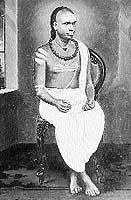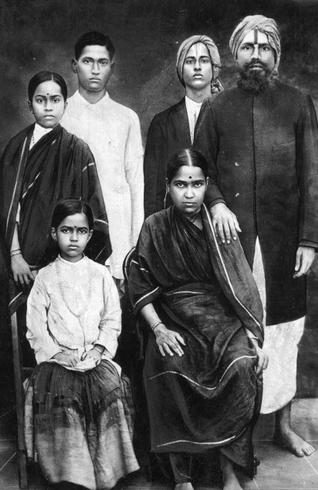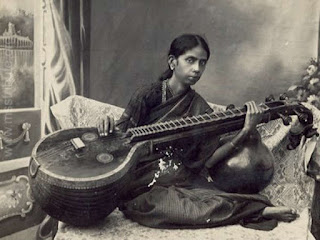18-kANi nilam VENDum
- Get link
- X
- Other Apps
https://www.rasikas.org/forums/viewtopic.php?p=204517#p204517
by arasi »
EIGHTEEN
kANi nilam VENDum
(A Piece of Land!)
In naLa varusham, in the month of Aippasi, on the eighth (16-11-16), a wednesday, an auspicious day, Bharathi's family moved house.
We were waiting for the rains, and on that day, a storm came, bringing with it the rain. In the afternoon, dark clouds gathered ominously.
Our house was a haven in summer but not so in the rainy season. But for the sunken room in the middle of the two stories, the road-side room and the room with a cradle in it--all other parts of the house got soaked if it rained hard.
We finished dinner at seven and went upstairs. My father, my two sisters and I, with the baby on my lap, sat on two benches. My mother was still downstairs in the kitchen.Heavy rains started in about an hour. We had read in the bhAgavatam of such a rain--the one IndrA had brought about. Now, we saw it with our own eyes. With every thunderbolt, the house shook. The lightening blinded our eyes.
Finger-thick strands of rain came down ceaselessly. One side of our house had a high wall. There was a law against building a wall that high.The owners had obviously ignored it when they built the house. It was an old house and the owner was no more. His wife was keen on collecting the rent but had not kept the house in good repair.
Whenever it thundered, the house shook violently. Around midnight, the wall on the eastern side with glass-paned windows came crumbling down. We were sheltered against the western wall. We were concerned that it might tumble down too. My father said, "If it does, we will all get crushed under it, but I don't think it will come to that, with God's grace."
We were petrified about how my mother was faring downstairs, all alone. There was no way to reach her. The wind blew mercilessly and we couldn't even hear each other in its fury, though we were huddled together. We realized that the back wall of the house was down too. It was horrendous all night.
At dawn, things calmed down and we stirred, and looked around us. On the floor, we saw pictures and the clock crashed to pieces. We hurried downstairs to look for my mother, hoping nothing had happened to her. She was fine and was relieved to see that the storm had spared us all.
After an hour, we opened the front door and saw that a river was flowing in it. About a furlong from us was a big drain and it had flooded. Wherever we looked, we saw fallen trees. Tree limbs were floating in it. Coconut and pUvarasu trees were uprooted. Electric posts and wires were in a sorry state.
Bharathi and Iyer came by and were relieved to see that our family was safe. "Who cares about house and belongings at this hour!", they said.
Iyer: Yadugiri, clean up as much as you can and try to get some food together. The poor are in a pathetic state. We are helping them as much as we can. Please ask your mother not to go the pond to take her customary bath. Corpses are floating around. After things get better, you can go out. Stay indoors!
We stayed in, but my mother went out to bathe. She would not listen to us. Those who were outside, asked her to go back home--"In such chaos, you won't be able to find the pond", they said. It didn't stop her. She did take her dip in the pond and came back home at noon!
The svadESis pooled together all the money they had and then sent Nagaswamy and others to collect more money to relieve the distressed. They gathered all the homeless in one place, treated the injured and took care of the dead. They arranged to cook gruel at Dharamarajan temple to feed them. Other good-hearted townsmen joined the volunteers. They gathered the fallen coconut tree fronds and started weaving panels for roofs. Workmen were herded to build walls for the huts. They made sure that all this work was done without any delay. They allotted work for themselves and helped the workmen.
Even in this calamity, Bharathi's love for Nature did not abate.
The next day, he told us a story: There was an old lady who came to me when I was learning the art of making a roof panel. She said, 'AppEn! My son! My house crumbled, melted in the rain and floated away. Will you rebuild it for me? I can't see very well and I have no one to call my own. Will you build my home up for me? God will bless you!". I asked her where her hut stood. She showed me a mere door frame with no trace of a door, windows or a roof and I laughed out when I saw this 'house'.
She said, "Had you seen my house before the rain and the wind, you would not have laughed but would have said what a beautiful place it was.You laugh now. These bodies of ours have the same fate in store. This wind came as yamA too!
My heart went out to her. She was right. After death, all you see is the skeletal frames of us. I said: Yes, AyA! You will get your house back.
Then we all worked together to build a hut for her.
This incident was published as an essay by Bharathi in the svadESa Mitran the next day.
I saw the meaning of SankarAchAryA's saying all around me--"When mAyA leaves us, then it's the state of nirvANA".
That afternoon, beating their drums, the town criers announced that it would take a month to restore water and electricity. For a week, women and children had to stay indoors. We had to get alternative sources for lights.
The town which was lush with coconut and pUvarasu trees looked like sandy terrain. It took the municipality a month to clear the debris and clean up the streets.
Kalavai Sankara Chettiar moaned: Had they made saplings out of the fallen pUVarasu, they would have grown into trees in four or five years. The municipality wants to plant new trees! What craziness!
After building the huts up, the volunteers found jobs for the poor. The liquor shops had been leveled in the storm and the drunkards of the town looked like normal people.
For nearly a month, gruel was made twice a day at the temple and the poor were well-fed. The svadESis worked as coolies for a month.
Our house was not repaired until after three months. Masons were hard to come by. It was the same with all others. We knew what vana vAsam (forest dwelling) would have been like, during those months of living without the facilities of a town.
In all this, Bharathi was as spirited as joyful as ever. He would do abhinayA to eTTU dikkum SidaRi and mimic the mammoth rain.
After the storm, he went to see all his favorite haunts--the beach, ponds and groves. A small coconut grove with not more than a hundred trees, but for a few fallen trees looked as if the storm hadn't touched it. Seeing that made him thank parASakti for saving a poor man's grove. This song is called pizhaitta tennandOppu. "Even the wind has been kind to a poor man", he exclaimed. We went to see that grove the next day. After Bharathi sang about it, it became the place of a miracle as it were, and crowds of people went to see it and were happy.
At this time, Japan had brought about a new law in their country. Cultivable land was divided equally among its people, to do away with beggars and lazy people. On learning about it, the svadeSis figured out how much land a small Indian family needed to live by. Bharathi sang about it in kANi nilam vENDum.
He also felt that after the age of twenty, the young should live independently and take care of themselves--without being a burden to their parents.
* * * * *
(A Piece of Land!)
In naLa varusham, in the month of Aippasi, on the eighth (16-11-16), a wednesday, an auspicious day, Bharathi's family moved house.
We were waiting for the rains, and on that day, a storm came, bringing with it the rain. In the afternoon, dark clouds gathered ominously.
Our house was a haven in summer but not so in the rainy season. But for the sunken room in the middle of the two stories, the road-side room and the room with a cradle in it--all other parts of the house got soaked if it rained hard.
We finished dinner at seven and went upstairs. My father, my two sisters and I, with the baby on my lap, sat on two benches. My mother was still downstairs in the kitchen.Heavy rains started in about an hour. We had read in the bhAgavatam of such a rain--the one IndrA had brought about. Now, we saw it with our own eyes. With every thunderbolt, the house shook. The lightening blinded our eyes.
Finger-thick strands of rain came down ceaselessly. One side of our house had a high wall. There was a law against building a wall that high.The owners had obviously ignored it when they built the house. It was an old house and the owner was no more. His wife was keen on collecting the rent but had not kept the house in good repair.
Whenever it thundered, the house shook violently. Around midnight, the wall on the eastern side with glass-paned windows came crumbling down. We were sheltered against the western wall. We were concerned that it might tumble down too. My father said, "If it does, we will all get crushed under it, but I don't think it will come to that, with God's grace."
We were petrified about how my mother was faring downstairs, all alone. There was no way to reach her. The wind blew mercilessly and we couldn't even hear each other in its fury, though we were huddled together. We realized that the back wall of the house was down too. It was horrendous all night.
At dawn, things calmed down and we stirred, and looked around us. On the floor, we saw pictures and the clock crashed to pieces. We hurried downstairs to look for my mother, hoping nothing had happened to her. She was fine and was relieved to see that the storm had spared us all.
After an hour, we opened the front door and saw that a river was flowing in it. About a furlong from us was a big drain and it had flooded. Wherever we looked, we saw fallen trees. Tree limbs were floating in it. Coconut and pUvarasu trees were uprooted. Electric posts and wires were in a sorry state.
Bharathi and Iyer came by and were relieved to see that our family was safe. "Who cares about house and belongings at this hour!", they said.
Iyer: Yadugiri, clean up as much as you can and try to get some food together. The poor are in a pathetic state. We are helping them as much as we can. Please ask your mother not to go the pond to take her customary bath. Corpses are floating around. After things get better, you can go out. Stay indoors!
We stayed in, but my mother went out to bathe. She would not listen to us. Those who were outside, asked her to go back home--"In such chaos, you won't be able to find the pond", they said. It didn't stop her. She did take her dip in the pond and came back home at noon!
The svadESis pooled together all the money they had and then sent Nagaswamy and others to collect more money to relieve the distressed. They gathered all the homeless in one place, treated the injured and took care of the dead. They arranged to cook gruel at Dharamarajan temple to feed them. Other good-hearted townsmen joined the volunteers. They gathered the fallen coconut tree fronds and started weaving panels for roofs. Workmen were herded to build walls for the huts. They made sure that all this work was done without any delay. They allotted work for themselves and helped the workmen.
Even in this calamity, Bharathi's love for Nature did not abate.
The next day, he told us a story: There was an old lady who came to me when I was learning the art of making a roof panel. She said, 'AppEn! My son! My house crumbled, melted in the rain and floated away. Will you rebuild it for me? I can't see very well and I have no one to call my own. Will you build my home up for me? God will bless you!". I asked her where her hut stood. She showed me a mere door frame with no trace of a door, windows or a roof and I laughed out when I saw this 'house'.
She said, "Had you seen my house before the rain and the wind, you would not have laughed but would have said what a beautiful place it was.You laugh now. These bodies of ours have the same fate in store. This wind came as yamA too!
My heart went out to her. She was right. After death, all you see is the skeletal frames of us. I said: Yes, AyA! You will get your house back.
Then we all worked together to build a hut for her.
This incident was published as an essay by Bharathi in the svadESa Mitran the next day.
I saw the meaning of SankarAchAryA's saying all around me--"When mAyA leaves us, then it's the state of nirvANA".
That afternoon, beating their drums, the town criers announced that it would take a month to restore water and electricity. For a week, women and children had to stay indoors. We had to get alternative sources for lights.
The town which was lush with coconut and pUvarasu trees looked like sandy terrain. It took the municipality a month to clear the debris and clean up the streets.
Kalavai Sankara Chettiar moaned: Had they made saplings out of the fallen pUVarasu, they would have grown into trees in four or five years. The municipality wants to plant new trees! What craziness!
After building the huts up, the volunteers found jobs for the poor. The liquor shops had been leveled in the storm and the drunkards of the town looked like normal people.
For nearly a month, gruel was made twice a day at the temple and the poor were well-fed. The svadESis worked as coolies for a month.
Our house was not repaired until after three months. Masons were hard to come by. It was the same with all others. We knew what vana vAsam (forest dwelling) would have been like, during those months of living without the facilities of a town.
In all this, Bharathi was as spirited as joyful as ever. He would do abhinayA to eTTU dikkum SidaRi and mimic the mammoth rain.
After the storm, he went to see all his favorite haunts--the beach, ponds and groves. A small coconut grove with not more than a hundred trees, but for a few fallen trees looked as if the storm hadn't touched it. Seeing that made him thank parASakti for saving a poor man's grove. This song is called pizhaitta tennandOppu. "Even the wind has been kind to a poor man", he exclaimed. We went to see that grove the next day. After Bharathi sang about it, it became the place of a miracle as it were, and crowds of people went to see it and were happy.
At this time, Japan had brought about a new law in their country. Cultivable land was divided equally among its people, to do away with beggars and lazy people. On learning about it, the svadeSis figured out how much land a small Indian family needed to live by. Bharathi sang about it in kANi nilam vENDum.
He also felt that after the age of twenty, the young should live independently and take care of themselves--without being a burden to their parents.
* * * * *
continued at
- Get link
- X
- Other Apps


